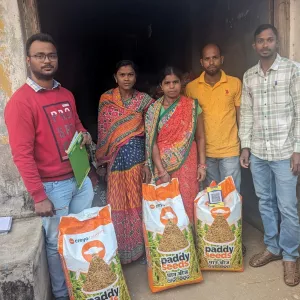Empowering women and improving rice yields and productivity through seed production
by Afreen Khan, Ranjitha Puskur, Suchaita Tenneti Two Farmer Producer Companies (FPC) in Odisha, India aim to further sustain their increased yields and bridge productivity gaps by facilitating and activating women’s entrepreneurship in paddy seed production. This blog is a part of IRRI’s 2024 International Women’s Day campaign. Can seed systems empower women? Gender is intricately woven into various

Empowering women and improving rice yields and productivity through seed production
by Afreen Khan, Ranjitha Puskur, Suchaita Tenneti
Two Farmer Producer Companies (FPC) in Odisha, India aim to further sustain their increased yields and bridge productivity gaps by facilitating and activating women’s entrepreneurship in paddy seed production. This blog is a part of IRRI’s 2024 International Women’s Day campaign.
Can seed systems empower women?
Gender is intricately woven into various facets of seed systems. Traditionally, women have held pivotal roles as seed custodians and managers, drawing upon their extensive knowledge of seed systems that are crucial for agricultural sustainability. They have excelled in identifying, preserving, and conserving seeds of varieties suitable for various climatic conditions. Women are actively involved in the various intercultural operations involved in seed production. Evidence shows that seed systems not only tend to reach women but have the potential to “benefit” and “empower” them as seed producers. However, women’s agency does not always translate into the formal seed sector and distinctive initiatives to facilitate their participation in formal seed production are essential. The collaboration between the International Rice Research Institute (IRRI) and the Access Livelihood Foundation (ALF) is an effort in this direction that seeks to give smallholder, women farmers in Odisha the opportunity to engage in paddy seed production.
Seeds of transformation
Nestled within the diverse agro-climatic landscape of Odisha, the districts – Bolangir and Kalahandi stand as a testament to resilience and transformation. Plagued by recurring droughts and famine-like situations, these southwestern districts have turned adversity into pivotal rice production hubs in the state. Once labeled the “land of hunger,” Kalahandi is now Odisha’s very own “rice bowl,” claiming the second position in the state’s rice production .

